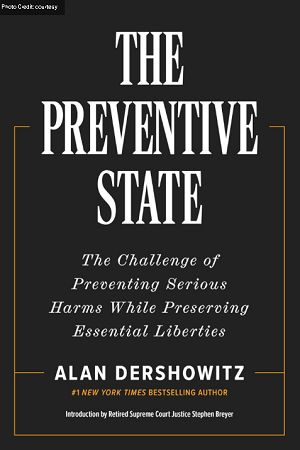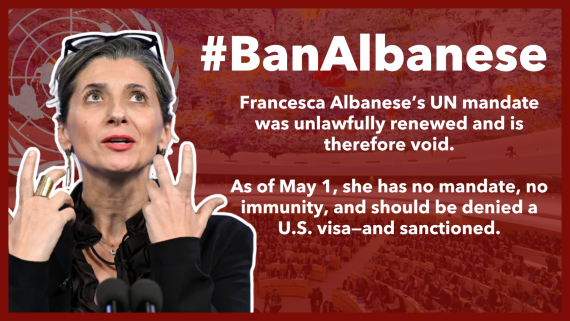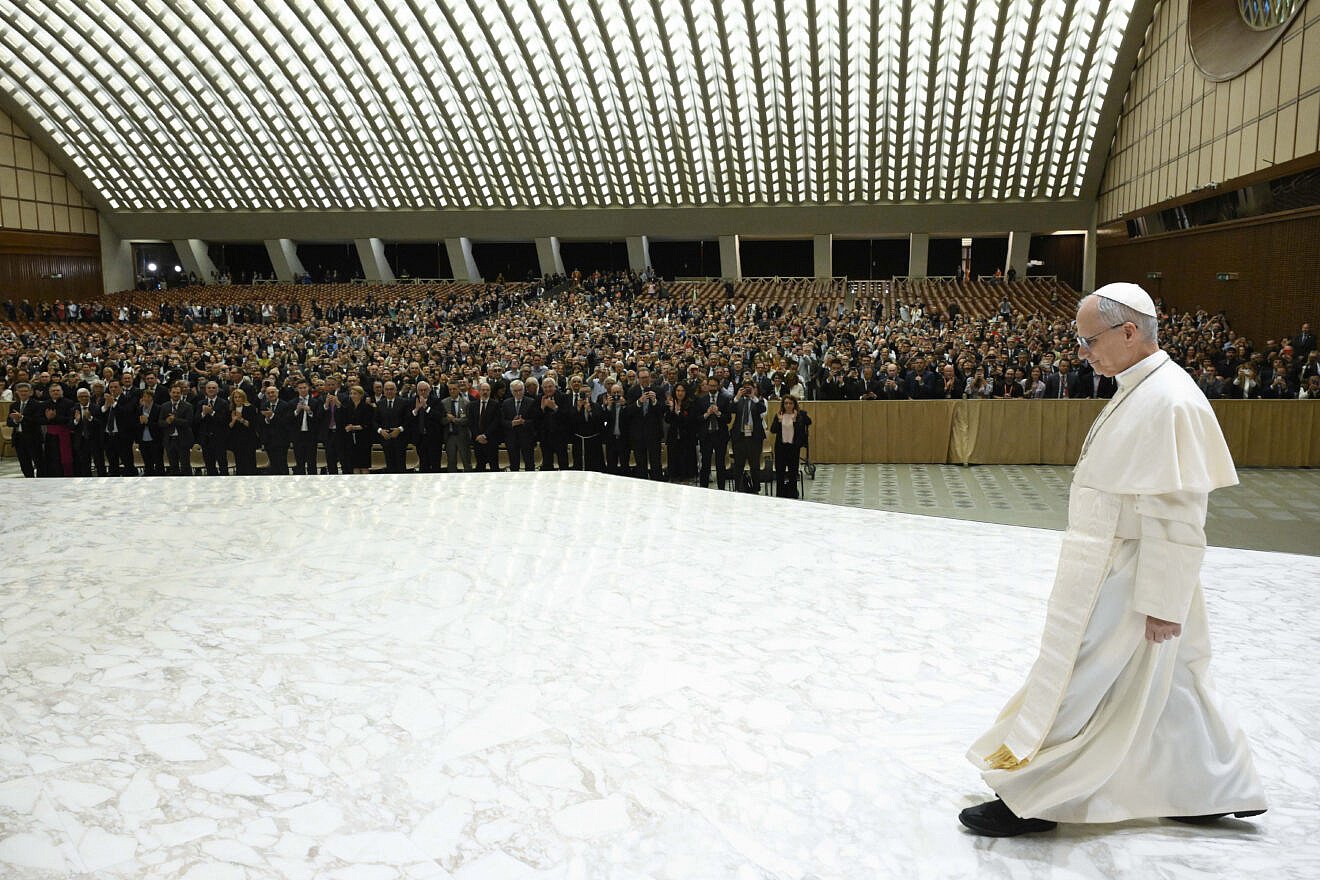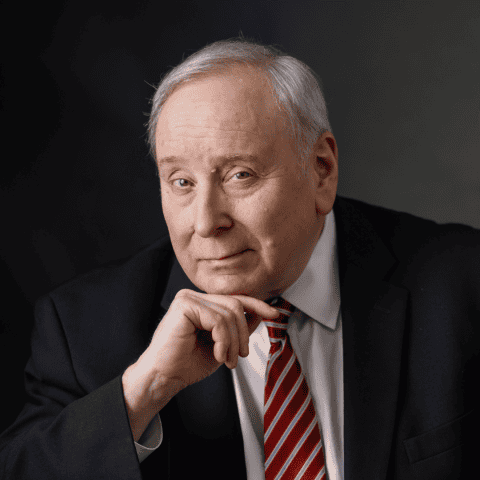Twoja nowa książka, The Preventive State, została opisana jako Twoje Magnum Opus. Jak to traktujesz?
Uczę tego przedmiotu na Harvard Law School i w innych miejscach od sześćdziesięciu lat, myślę, że to moja najbardziej kreatywna i najważniejsza książka. Dotyczy tego, jak rządy zmieniają swoje podejście z czekania na wystąpienie szkody na przewidywanie jej z wyprzedzeniem. Ta zasada opiera się na zaleceniu Rodef Din z Tory: nie czekasz, aż ktoś zabije. Pierwszy go ścigasz. Mogę również zacytować to z innego przepisu Tory, części odczytanej podczas mojej Bar Micwy: Tzedek, Tzedek, Tirdof [do sprawiedliwości, do sprawiedliwości będziesz dążył]. Nie mówi ona tylko raz „Tzedek”, że po fakcie szukasz Sprawiedliwości — jeśli możesz, zapobiegnij wystąpieniu niesprawiedliwości, zanim ona nastąpi.
Na przykład Tora mówi o „krnąbrnym synu” (Ben Sorer U’moreh, Księga Powtórzonego Prawa 21:18-21), a Tora zawiera również wiele środków zapobiegawczych, takich jak zapobieganie rozprzestrzenianiu się chorób poprzez umieszczanie osób chorych na trąd poza obozem. Estera i Mordechaj zaangażowali się w wojnę zapobiegawczą. Powstali i zabili zwolenników Hamana, zanim ci zdołali zabić Żydów. Tak więc kwestia zapobiegania sięga bardzo, bardzo dawno, czasów Tory.
W ostatnich latach zaczynamy to jednak widzieć w społeczeństwie obywatelskim z deportacjami, odmową zwolnienia za kaucją, wojną prewencyjną, jak potencjalny atak na irański reaktor jądrowy. Gdybyśmy mogli zapobiec 7 października, zabijając 10 przywódców Hamasu 6 października, zrobilibyśmy to i powinniśmy byli to zrobić. Więc to, czego potrzebujemy, to jurysprudencja prewencyjna. Tym, co próbowałem zrobić w The Preventive State, to skonstruowanie takiej jurysprudencji, dlatego jest to moja najważniejsza książka, moje Magnum Opus, to, które wymagało, bym stał się „Starszym” Syjonu, żeby ją napisać.
Równocześnie jednak wspominasz w książce o problemie przekroczenia granic. Można próbować przewidywać, ale są pewne ograniczenia. Jednym ze sposobów radzenia sobie z tym jest analiza kosztów i korzyści, którą wykonujesz. Mówisz o tym w całej książce, ale czy możesz krótko opisać, jak to działa?
Za każdym razem, gdy państwo robi coś, aby zapobiec szkodliwemu czynowi, odmawia komuś wolności. Pytanie brzmi: ilu osobom bylibyśmy skłonni odmówić wolności i do jakiego stopnia, aby zapobiec jakiemuś okropnemu czynowi?
Podam przykład: Izrael niedawno zaatakował szpital i według ostatnich doniesień, zabił od siedmiu do dziesięciu głównych przywódców Hamasu, którzy nielegalnie korzystali ze szpitala, ukrywając się wśród cywilów. Tak więc izraelskie wojsko musiało przeprowadzić analizę kosztów i korzyści. Zabijając przywódców Hamasu, zapobiegli zabiciu wielu, wielu ludzi, ale kosztem zabicia kilku innych. To jest rodzaj analizy kosztów i korzyści, jaką mamy.
To też zaczyna się w Torze, kiedy Abraham spiera się z Bogiem o zniszczenie Sodomy. Co jeśli jest 50 niewinnych, 40 niewinnych? Potem analizują, targują się i zawierają układ, zatrzymując się ostatecznie na 10. Wynika z tego lekcja, że nie jest w porządku zabicie trzydziestu lub czterdziestu niewinnych osób, by ukarać winnych, ale może być konieczne zabicie siedmiu, ośmiu lub dziewięciu niewinnych osób. Nie ma nic za darmo; zawsze będzie to kompromis. I myślę, że ten kompromis jest dobrze odzwierciedlony w historii Abrahama i Sodomy.
Wspominasz w swojej książce, że ta historia stanowi podstawę tego typu analizy przyczyn.
Formuła Williama Blackstone’a, „Lepiej, żeby dziesięciu winnych uniknęło kary, niż żeby jeden niewinny cierpiał”, pochodzi bezpośrednio z tej historii, ponieważ użyto liczby dziesięć. Kiedy ludzie tacy jak Blackstone i inni, którzy bardzo dobrze znali Torę, konstruowali współczesną jurysprudencję anglo-amerykańską, zwrócili się do źródeł biblijnych.
Wspomniałeś o Hamasie i kwestii terroryzmu. Obecnie w prawie międzynarodowym jedną z najbardziej palących kwestii jest stosowanie prawa w wojnie z terroryzmem. Jak myślisz, w jaki sposób prawo międzynarodowe powinno odnosić się do terroryzmu, by mogło być zarówno skuteczne, jak i sprawiedliwe?
Cóż, nie może tego zrobić z jednego powodu: jeśli prawo stosuje się, to tylko do demokracji, a nigdy nie stosuje się do terrorystów. Hamas nawet nie udaje, że przestrzega prawa międzynarodowego. Przyklaskiwali zabiciu kobiety w ciąży, która miała urodzić. Nikt, zgodnie z prawem międzynarodowym, nie usprawiedliwiłby tego. Ale Hamas nie dba o to, więc stosowanie prawa międzynarodowego wiąże ręce demokracji, a dziś robi się to w bardzo, ale to bardzo niesprawiedliwy sposób.
Powiedziałbym, że główną funkcją prawa międzynarodowego jest dziś atakowanie Izraela i główną funkcją praw człowieka jest atakowanie Izraela. Nie widzisz prawa międzynarodowego ani praw człowieka stosowanych przeciwko Syryjczykom, gdy zabijali, ani przeciwko temu, co dzieje się w Sudanie, ani przeciwko temu, co Chińczycy robią Ujgurom. Międzynarodowe prawa człowieka są używane tylko przeciwko Izraelowi. Stały się bronią w wojnie przeciwko Izraelowi i syjonizmowi.
Masz oryginał listu Thomasa Jeffersona, w którym pisze: „Nie mamy się czego obawiać z powodu demoralizującego rozumowania niektórych, jeśli inni będą mieli swobodę pokazania ich błędów, a zwłaszcza, że prawo jest gotowe ukarać pierwszy czyn przestępczy wywołany fałszywym rozumowaniem”. Ale co się dzieje, gdy protestujący na kampusie uniemożliwiają pro-izraelskim mówcom przemawianie na terenie kampusu, a policja nie chce lub nie może ukarać tego pierwszego czynu przestępczego? Co powiedziałby Jefferson dzisiaj?
Cóż, Jefferson mylił się wtedy i napisałem o tym książkę zatytułowaną Finding Jefferson, w której krytykowałem to konkretne stwierdzenie widniejące w liście wiszącym na mojej ścianie. Mamy wiele do stracenia, wiele szkód, ale masz rację, rynek idei nie pomaga. Przykład: przez 11 lat odkąd przeszedłem na emeryturę z Harvardu, nie pozwolono mi ani razu mówić o Izraelu na terenie kampusu Harvardu. Rzadko zapraszano mnie na jakikolwiek kampus, aby mówić o Izraelu. Ale każdy mówca antyizraelski jest witany z otwartymi ramionami, a jego prawa wynikające z Pierwszej Poprawki są chronione, i chronione także przeze mnie. Ale moje prawo wynikające z Pierwszej Poprawki do przemawiania na terenie kampusów uniwersyteckich i prawa wynikające z Pierwszej Poprawki studentów pro-izraelskich do słuchania, jak przedstawiam swoje argumenty, nie są chronione na terenie kampusu. Dlatego zdecydowałem się napisać tę małą broszurkę i udostępniliśmy milion jej egzemplarzy rozdawanych bezpłatnie studentom w całym kraju, a właściwie na całym świecie: The 10 Big Anti-Israel Lies, and How to Refute Them With Truth [10 wielkich kłamstw antyizraelskich i jak obalić je prawdą]. Rozdajemy je, ponieważ nie mogę przemawiać na tych kampusach, ale mogę przemawiać przez moje książki. Nie mogą mnie powstrzymać ani powstrzymać grup pro-izraelskich na kampusie i Chabad przed rozdawaniem mojej broszury. Przynajmniej część moich myśli trafia na rynek idei na przynajmniej kilku kampusach uniwersyteckich.

Jednym z narzędzi sprawiedliwego stosowania prawa międzynarodowego, jak zakładamy, są sądy międzynarodowe, MTK, MTS i sądy europejskie. Co sądzisz o pracy, jaką obecnie wykonują?
Są gorsze niż nic, dużo gorsze niż nic. Gdyby to było nic, można by przynajmniej powiedzieć, cóż, każdy kraj musi sam zdecydować, czym jest prawo międzynarodowe. Międzynarodowy Trybunał Sprawiedliwości nie jest międzynarodowy, nie jest sądem i nie rozumie sprawiedliwości. Nie jest międzynarodowy, ponieważ wyklucza wiele krajów z możliwości zasiadania w nim. Nie jest sądem, ponieważ sędziowie są wybierani przez kraje i nigdy nie wykazywali żadnego zainteresowania sprawiedliwością. To samo stało się teraz o wiele bardziej prawdziwe w przypadku Międzynarodowego Trybunału Karnego i Europejskiego Trybunału Sprawiedliwości. Wszystkie są stronnicze. Wszystkie są lewicowe. Wszystkie są antyizraelskie, antyamerykańskie, antychrześcijańskie i antyzachodnie i są hańbą. Byłoby lepiej, gdyby wszystkie zostały zlikwidowane. Teraz byłbym za zniesieniem Międzynarodowego Trybunału Karnego i Międzynarodowego Trybunału Sprawiedliwości. Byłbym również za zniesieniem Organizacji Narodów Zjednoczonych. Jeśli masz organizacje, które wyrządzają więcej szkody niż pożytku, które przyczyniają się do promowania wypaczonych wartości i podwójnych standardów, o wiele lepiej jest nie mieć żadnych instytucji, niż mieć złe instytucje.
Więc raczej całkowicie byś je zlikwidował niż zastąpił czymś innym.
Zniósłbym je całkowicie. Nie sądzę, aby istniała możliwość stworzenia sprawiedliwego sądu międzynarodowego, który sprawiedliwie osądzałby Izrael, Stany Zjednoczone i zachodnie demokracje. Myślę, że wydawanie sprawiedliwych wyroków dzisiaj przekracza nasze możliwości. Pozostawiłbym sądom krajowym egzekwowanie prawa międzynarodowego. Kraje takie jak Stany Zjednoczone, Izrael i Anglia egzekwowałyby prawo międzynarodowe. Oczywiście kraje takie jak Chiny i Iran tego nie zrobiłyby, ale tak jest również dzisiaj, ponieważ te kraje ignorują Organizację Narodów Zjednoczonych.
Cytuję z twojej książki: „prawie wszystkie agresywne ataki militarne można usprawiedliwić używając gładkiego języka prewencji”. A co z drugą stroną? Dzisiaj widzimy „gładki język” oporu – opór jako usprawiedliwienie tego, co Hamas zrobił 7 października, opór używany jako usprawiedliwienie dla licznych ataków terrorystycznych. Czy istnieje coś takiego jak prawo do stawiania oporu?
Nie ma prawa do stawiania oporu poprzez zabijanie niewinnych ludzi. Przede wszystkim opór jest w umyśle obserwatora. Palestyńczycy mogli mieć państwo w 1937, 1938, 1947, 1948, 1967, 2000, 2001, 2005 i 2007 roku. Za każdym razem je odrzucali. Mieli możliwość posiadania państwa na mocy prawa i negocjacji. Powiedzieli nie i zamiast tego użyli przemocy. To nie jest prawo w żadnym moralnym, prawnym ani praktycznym systemie prawa. Palestyńczycy zrzekli się swojego prawa do stawiania oporu lub posiadania państwa, odrzucając pokojowe oferty państwowości.
Posłuchaj Billa Clintona, kiedy mówi, że w latach 2000-2001 osobiście, wraz z Ehudem Barakiem, zaoferował Palestyńczykom 96% Zachodniego Brzegu, 4% obecnego Izraela, stolicę w Jerozolimie, całą Gazę i prawo powrotu dla części uchodźców. Arafat nie tylko to odrzucił, ale także rozpoczął intifadę, w której zginęło 4000 ludzi. Nie ma prawa stawiania oporu, gdy kraj odrzucił możliwość uzyskania tego, czego twierdzi, że chce. Powodem, dla którego Palestyńczycy nie akceptują żadnych procesów pokojowych, jest to, że nie obchodzi ich własne państwo; zależy im tylko na tym, żeby nie było państwa żydowskiego. Mówimy o rozwiązaniu w postaci dwóch państw, które Palestyńczycy odrzucili. Palestyńczycy zaakceptowaliby rozwiązanie bezpaństwowe: żadnego państwa palestyńskiego – pod warunkiem, że nie będzie państwa izraelskiego. Więc, jak powiedział Bill Clinton w swoich komentarzach, Palestyńczycy nie chcą państwa. Oni po prostu chcą zabijać Żydów – to ich przywództwo, nie mówię o przeciętnym Palestyńczyku. Zatem nie, nie istnieje prawo do stawiania oporu, ani moralnie, ani prawnie.
Piszesz również: „Istotne jest także to, że Izrael nie odpowiedziałby na nuklearne zniszczenie Tel Awiwu, niszcząc Teheran”. To oznacza, że istnieją pewne granice odwetu. A co z odwetem Izraela przeciwko Hamasowi i Gazie? Czy uważasz, że istnieją granice prawne dla Izraela do odwetu, a jeśli tak, czy Izraelowi udało się utrzymać te granice?
Najpierw odpowiem na drugie pytanie. Izrael pozostał w tych granicach. Izrael zabił mniej cywilów niż jakikolwiek inny kraj w nowoczesnej wojnie, w porównaniu do liczby zabitych uczestników walki. To, co robi Izrael, jest prewencyjne, a nie odwetowe; ma na celu uniemożliwienie Hamasowi dotrzymania obietnicy. Hamas obiecał wielokrotne powtórzenie 7 października i dopóki nie zrezygnuje ze swoich tuneli i nie zrezygnuje ze swoich morderczych działań Izrael ma prawo próbować zabić jego przywódców i członków. A jeśli jego przywódcy i członkowie ukrywają się wśród cywilów, Izrael ma prawo próbować zabić tych przywódców, nawet jeśli oznacza to proporcjonalną liczbę ofiar cywilnych. Izrael działa nie tylko w ramach prawa międzynarodowego, ale także lepiej radzi sobie ze zmniejszaniem liczby ofiar cywilnych niż jakikolwiek inny kraj w historii współczesnej, który stanął w obliczu porównywalnych zagrożeń.
Ludzie oskarżają Izrael o ludobójstwo, twierdząc, że liczba ofiar świadczy o zamiarze popełnienia przestępstwa lub że jest wystarczająca, nawet jeśli nie było takiego zamiaru.
Musi być coś więcej niż zamiar; musi być ludobójstwo. Nie ma ludobójstwa. Gdyby Izrael chciał zabić wszystkich Palestyńczyków w Strefie Gazy, mógłby to z łatwością zrobić. Populacja Strefy Gazy i populacja Palestyńczyków w Izraelu na Zachodnim Brzegu dramatycznie wzrosła. Więc, jak ktoś to ujął, jeśli Izrael próbował dokonać ludobójstwa, to jest najbardziej nieudolnym narodem ludobójczym w historii świata. Ponieśli w tej rzekomej próbie żałosną porażkę, ponieważ zwiększyli liczbę Palestyńczyków na całym Bliskim Wschodzie. Więc oczywiście twierdzenia o ludobójstwie nie mają nawet najmniejszego uzasadnienia. Nawet nie ma powodu do przywoływania zamiaru. Nie ma nawet znaczenia, jaki jest zamiar; nie było żadnego aktu, który stanowiłby cokolwiek zbliżonego do ludobójstwa. Gdyby Hamas odniósł sukces 7 października i opanował Tel Awiw i wkroczył do Ber-Szewy i innych miast, doszłoby do ludobójstwa, ale tak się nie stało. Izrael nigdy nie miał zamiaru zabijać niewinnych cywilów. Niewinni cywile zginęli, bo Hamas wykorzystał ich jako żywe tarcze.
W swojej książce opisujesz to, co nazywasz kontinuum cywilności. Jak to działa i jak stosuje się do tego, co dzieje się teraz w Gazie?
To działa idealnie w przypadku Gazy. Masz prawdziwych cywilów, dzieci, bardzo starych ludzi i ludzi, którzy sprzeciwiają się Hamasowi. To są prawdziwi cywile. Z drugiej strony masz prawdziwy Hamas. Wiesz, Sinwar, przywódcy i terroryści, ludzie, którzy rzucają bombami. Pośrodku masz całą masę ludzi. Na przykład 7 października nie tylko ludzie z Hamasu przekroczyli granicę, zabijali, gwałcili i ścinali głowy, ale cywile z Hamasu brali w tym udział. Tracą swój status cywilów, gdy biorą udział w zabijaniu innych cywilów, a potem masz ludzi, którzy pozwalają, aby ich domy były używane do przechowywania broni lub wystrzeliwania rakiet i do przetrzymywania zakładników. To wszystko są ludzie, którzy znajdują się na kontinuum przestępczości i terroryzmu. Nie ma absolutnej, jasnej, czarno-białej granicy między terrorystą a cywilem. Wiele osób podających się za cywilów jest tak głęboko zaangażowanych w działalność terrorystyczną Hamasu, że ich miejsce na tym kontinuum jest bliższe terrorystom niż cywilom.
W swojej książce krytykujesz Olivera Wendella Holmesa i odnosisz się do słynnego przypadku krzyczenia „pożar” w zatłoczonym teatrze, co nawet nie mieści się w kategorii wypowiedzi, wolnej czy innej. Piszesz: „Przekaz ‘pożar’ nie jest skierowany do umysłu i sumienia słuchacza, ale raczej do jego adrenaliny i stóp. Nie jest to zaproszenie do dyskusji, kłótni lub niezgadzania się. Jest to bodziec do natychmiastowego działania, a nie do przemyślanej refleksji”. A co z dzisiejszymi wydarzeniami na kampusach i ulicach, kiedy protestujący skandują, obrażają i jasno dają do zrozumienia, że nie zapraszają ludzi do dyskusji lub przedstawiania argumentów, ale raczej tworzą bodziec do natychmiastowego działania, zastraszania i nękania? Gdzie to pasuje do wolności słowa?
Kiedy na kampusach uniwersyteckich spotykasz ludzi, którzy krzyczą: „Śmierć Żydom”, którzy nawołują do uniemożliwienia Żydom chodzenie na zajęcia, którzy wołają o natychmiastowe ataki i nękanie Żydów – to nie jest to chroniona mowa. Z drugiej strony, jeśli wygłaszasz abstrakcyjne przemówienie i mówisz, że dobrze byłoby, gdyby nie było Izraela – to taka mowa nienawiści jest chronioną mową. Nie powinno się wytyczać granicy na podstawie [takiego zjawiska jak] okrzyk „pożar” w teatrze. To bardzo głupia analogia, jedna z najgłupszych, najbardziej mylących rzeczy, jakie Oliver Wendell Holmes kiedykolwiek powiedział. Ale jest granica między bezpośrednim podżeganiem a bardziej abstrakcyjnym argumentem. Abstrakcyjne argumenty, nawet jeśli są pełne nienawiści, są dozwolone na mocy naszej Konstytucji. Ale bezpośrednie podżeganie do zabijania lub krzywdzenia innych ludzi lub blokowania im dostępu lub odmawiania im możliwości chodzenia na zajęcia – te nie są chronione przez Pierwszą Poprawkę.
Nadal czekamy, aż uniwersytety zaczną dostrzegać ten fakt.
Nadal czekamy i myślę, że dobrze, że rząd federalny wywiera pewną presję. Myślę, że same uniwersytety nie są skłonne do zmiany i alienowania swoich radykalnych wykładowców i radykalnych studentów, chyba że nie mają wyboru. Myślę, że administracja Trumpa postąpiła słusznie, wywierając presję. Nie sądzę, że powinniśmy kiedykolwiek wycofywać finansowanie badań medycznych i naukowych, ale wycofanie finansowania dla organizacji aktywistów na terenie kampusu, takich jak Intersectionality i DEI, Black Lives Matter i Critical Race Studies – to wszystko jest dobrą rzeczą.
Mówisz o mowie nienawiści, która jest chroniona. Ale żeby było jasne, jest chroniona tylko wtedy, gdy jest abstrakcyjna.
Kiedy jest abstrakcyjna, kiedy jest częścią dyskusji. Ale nikt nie chce debatować. Zaproponowałem debatę z najgorszymi izraelożercami, ale oni nie chcą ze mną debatować. Wiedzą, że nie mogliby wygrać w debacie, ponieważ ich strona jest tak słaba. Historia jest tak bardzo przeciwko nim. Jak wytłumaczysz fakt, że tyle razy odrzucali państwowość, a teraz są gotowi zabijać?
A tak nawiasem mówiąc, nie ma ani jednego demonstranta na żadnym kampusie uniwersyteckim na świecie, ani jednego demonstranta, który kiedykolwiek wzywał do rozwiązania w postaci dwóch państw. Nie, oni nie chcą rozwiązania w postaci dwóch państw. Są w pełni zadowoleni z rozwiązania w postaci jednego państwa. Tylko Palestyna, żadnego Izraela, lub choćby rozwiązania bezpaństwowego. Ale nigdy nie zaakceptują rozwiązania, które włącza i obejmuje prawo Izraela do istnienia jako państwa narodowego narodu żydowskiego.
Krytykujesz to, co nazywasz grą etykietowania, rozróżniając miedzy sankcjami prewencyjnymi i karnymi. A co z sugestią Trumpa dotyczącą deportacji mieszkańców Gazy? Czy deportacje byłyby bardziej legalne, gdyby były przedstawiane jako prewencyjne, a nie czysto karne?
Nie, ale myślę, że byłoby to bardziej legalne, gdyby było dobrowolne, gdyby administracja oferowała coś Palestyńczykom, którzy żyją pod rządami Hamasu w Gazie w nędznych warunkach. Gdyby dano im wybór, czy przenieść się do Libii lub innego państwa arabskiego, otrzymać pomoc finansową, z rodzajem planu Marshalla, żeby zbudować społeczność gdzie indziej, czy też opuścić Gazę tymczasowo i odbudować, pozwalając na powrót tylko tym, którzy nie są zwolennikami Hamasu. To mogłoby być rozsądne podejście. Pochwalam Trumpa za przedstawienie kilku sugestii i pomysłów. Status quo w Gazie jest nie do przyjęcia, ale myślę, że można być krytycznym wobec każdej z konkretnych propozycji i trzeba uważać, aby upewnić się, że będą one zgodne z moralnością i prawidłowym stosowaniem zasad prawnych.
A co z embargiem Izraela nałożonym na Gazę, które ma charakter prewencyjny, a nie karny?
Zacznijmy od obalenia kłamstwa. Nikt nie głoduje w Gazie. Od 8 października słyszeliśmy, że mieszkańcy Gazy głodują. To po prostu kłamstwo. Nikt nie głoduje i nikt nie głodował. Trzeba pamiętać, że mieszkańcy Gazy otrzymywali wiele żywności przez miesiące i robili zapasy. Bardzo dużo żywności trafiło do Hamasu. Bardzo dużo środków medycznych trafiło do Hamasu.
Żaden kraj nie jest zobowiązany do wysyłania żywności lub leków ludziom, którzy próbują ich zabić. Ostatecznie, jeśli Hamas chce dostać więcej żywności, niech wypuści zakładników. Ale teraz zakładnicy nie dostają posiłków. Dostają kawałek chleba, a wiemy, że wielu z nich zostało zabitych, wielu z nich zmarło. Trzeba mieć ogromną tupet, żeby ci, którzy zabijają niewinnych zakładników, narzekali, że być może nie dostają wystarczającej ilości jedzenia. Są zdjęcia otwartych targowisk, otwartych straganów, sprzedających świeże warzywa i owoce, a mieszkańcy Gazy mają mnóstwo okazji do uprawy własnej żywności. Jest nawet pozwolenie na połowy ryb w niektórych rejonach. Myślę, że media muszą obnażyć kłamstwo o głodzie i niedożywieniu w Gazie. To po prostu kłamstwo, które jest powtarzane od prawie dwóch lat.
Jakieś przemyślenia na koniec?
Myślę, że pytanie, które należy zadawać cały czas, brzmi: „Dlaczego Żydzi?” Dlaczego świat, szczególnie lewica, zwrócił się tak zaciekle przeciwko Żydom? Nie można obwiniać Izraela, ponieważ było tak przed Izraelem. To wydarzy się ponownie. Jest tu podwójny standard. Ludzie pytają mnie cały czas: jaka jest twoja definicja antysemityzmu? To takie proste: stosowanie podwójnych standardów wobec wszystkiego żydowskiego – państwa żydowskiego, narodu żydowskiego i organizacji żydowskich. Wszystko, w czym stosuje się podwójne standardy, które są negatywne wobec Żydów lub państwa żydowskiego, jest antysemityzmem. To takie proste, ale niezmiernie ważne. I to właśnie dzieje się na kampusach uniwersyteckich. Nie można powiedzieć złego słowa o pewnych faworyzowanych grupach, Afroamerykanach, kobietach i gejach. Powodem, dla którego Claudia Gay została zwolniona z Harvardu, nie było to, że powiedziała, że to kwestia kontekstu, gdy ktoś wzywa do ludobójstwa Żydów. To nie był powód. Wcześniej powiedziała, że to nie jest kwestia kontekstu. Nigdy nie można powiedzieć nic negatywnego o kobietach, gejach czy czarnoskórych i ona stosowała te podwójne standardy, i to bardzo słusznie doprowadziło do jej zwolnienia.
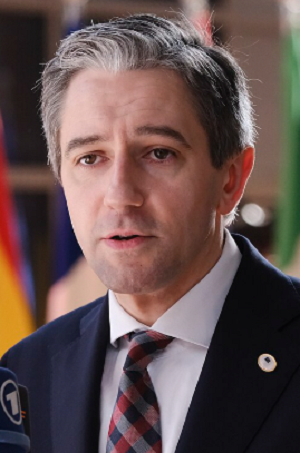 Simon Harris – Irlands regeringschef
Simon Harris – Irlands regeringschef Irlandia pierwszym krajem w Europie, który wprowadza zakaz importu z Izraela
Irlandia pierwszym krajem w Europie, który wprowadza zakaz importu z Izraela



